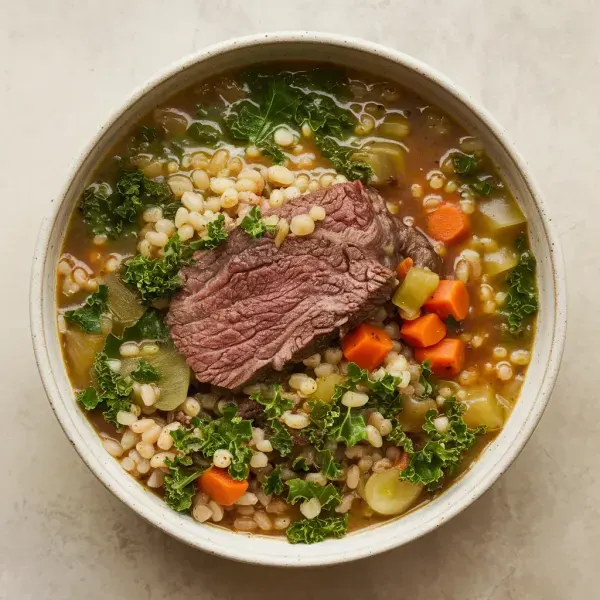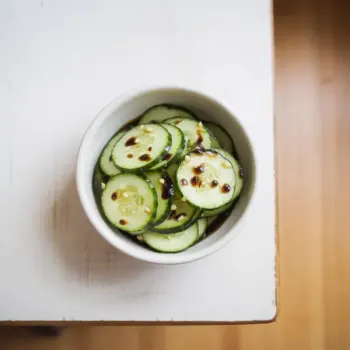
 150 minutes
150 minutesA comforting, hearty stew made with tender beef short ribs, barley, and vegetables.


Boneless Beef Short Ribs, cut into 1-inch chunks
0 lb
to taste
to taste
tablespoons
Medium carrots, split in half and sliced into 1/2-inch chunks
each
Medium Ribs Celery, split in half and sliced into 1/2-inch chunks
each
Large Onion, finely diced
each
Marmite
teaspoons
teaspoons
Garlic Clove, grated on a microplane grater
each
tablespoons
Low-Sodium Chicken Broth
quarts
Whole Peeled Tomatoes, drained and roughly chopped
0 oz
Pearl Barley
cups
each
Kale Leaves, roughly torn
cups
1. Season the Beef
Begin by seasoning the beef short ribs generously with kosher salt and freshly ground black pepper in a large bowl. This step is crucial as it enhances the flavor of the meat throughout the stew.
2. Brown the Beef
Heat the canola oil in a Dutch oven or a large saucepan over medium-high heat. Once the oil is shimmering, add the seasoned beef chunks. Brown the beef on all sides for about 10 minutes until it develops a rich, deep color. This browning process is vital as it builds a robust flavor foundation for your stew. Remove the beef from the pot and set aside.
3. Cook the Vegetables
In the same pot, add the carrots, celery, and onion. Cook the vegetables for about 4 minutes, stirring occasionally, until they start to soften and develop a bit of color. The browning of the vegetables contributes to the sweetness and depth of the stew.
4. Add Marmite, Soy Sauce, Garlic, and Tomato Paste
Add the marmite, soy sauce, grated garlic, and tomato paste to the pot. Stir well and cook for about 30 seconds until the mixture is fragrant and the tomato paste has darkened slightly, which helps to release and meld the flavors.
5. Add Broth, Tomatoes, Barley, and Bay Leaves
Pour in the chicken broth, scraping the bottom of the pot to deglaze and release any browned bits, which add richness to the stew. Add the chopped tomatoes, pearl barley, and bay leaves. Stir everything well to combine.
6. Simmer the Stew
Return the browned beef to the pot. Bring the stew to a boil, then reduce the heat to low. Cover the pot and let it simmer gently for about 2 hours. This slow simmering tenderizes the beef and allows the flavors to meld beautifully. You'll know it's ready when the beef is tender and the barley is cooked through.
7. Add Kale
In the final minutes of cooking, stir in the roughly torn kale leaves. Let the stew cook for another 2 minutes until the kale has wilted and is tender.
8. Adjust Seasoning and Serve
Taste the stew and adjust the seasoning with more salt and pepper if needed. Serve the stew hot, or let it cool and refrigerate in a sealed container for up to 5 days to develop even deeper flavors.
Replace beef short ribs with pork shoulder cut into chunks for a stew with a richer, slightly sweeter flavor.
Add soy sauce, star anise, ginger, and replace barley with rice or daikon radish. Use beef or pork and finish with a sprinkle of scallions and a dash of sesame oil.
For a lighter option, use bone-in, skinless chicken thighs or legs. Adjust the cooking time accordingly.
Incorporate spices such as cumin, coriander, cinnamon, and a touch of harissa, and use lamb as the protein. Serve with couscous for a North African twist.
Use lamb shoulder or shanks instead of beef for a stew with a more gamey, earthy taste.
Look for short ribs with a good amount of marbling as this will render down during the slow cooking process, adding flavor and tenderness to the stew. English-cut short ribs are preferable for their meat-to-bone ratio, which is ideal for stewing.
Properly brown your short ribs by drying them, seasoning well, and searing in a hot pot. This creates a rich fond that adds complexity to your stew's flavor profile.
Allow the stew to simmer gently for a few hours until the short ribs are fork-tender, letting flavors meld together.
Sweat onions, carrots, and celery, then add tomato paste and caramelize it with the vegetables for umami depth.
Remove short ribs, shred the meat, discard bones and excess fat, return meat to pot, adjust seasoning, and finish with freshly chopped parsley.




Comments (0)